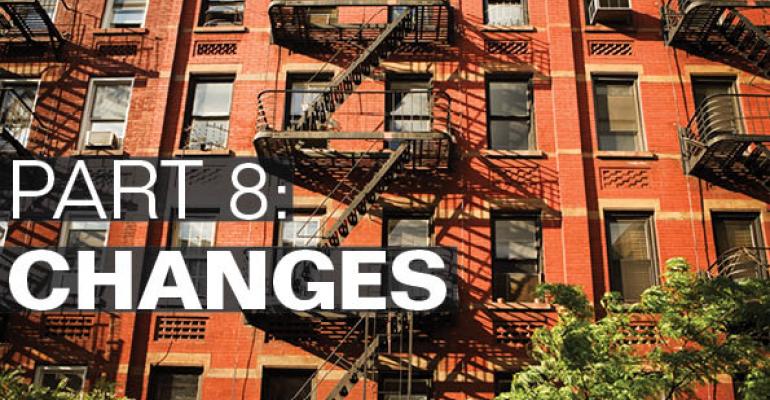NREI's 2014 Multifamily Housing Survey gathered feedback on the outlook for the industry from 947 respondents, including real estate investors, developers, brokers, managers and other real estate professionals. Here, we offer a selection of anonymous responses in answer to this question: What are some of the biggest changes you’re seeing with managing apartment properties?
“The use of computer models has really driven revenue in professionally managed properties. By maintaining some level of vacancy due to higher rents, revenue has grown quite well. Developers have listened to the rental demographic and are building smaller units with more project amenities. This trend is also seen in tech-centric office projects.”
“With so much uncertainty, no pressure on rents to rise and rates to fall and a glut of available supply, smart owners are putting cash into facility improvements until the path is clear and the situation stabilizes. Or is this the new normal?”
“The nature of the tenants has broadened to include people and families from all walks of life. It’s not the traditional transient population we used to see 10 years ago.”
“Some companies that manage either rental or apartment properties for larger companies (owners) are charging more for their service while doing less of the work and leaving the renters or the landlords [with more] responsibilities.”
“Security and security systems costs continue to become increasingly important. And volatile winter weather patterns increasingly add to snow removal costs. These and other cost increases are adding up and bumping average standard garden apartment operating costs towards $5,000 per unit.”
“I think we may begin producing managers who understand how to manage affordable housing. It’s a very tough business, but there is high demand for talented management agents. I think we will see increases in third-party management contracting as larger owners figure out that they cannot do an effective job in all markets, especially mid-markets.”
“I think property managers need to be very strategic in how they choose to increase/decrease rents. Many markets are seeing a large wave of new supply and property managers have to determine if they are still able to increase rents on renewals/and new leases.”
“As social media continues to be a large part of many multifamily customers’ lives, apartment managers need to be delivering their services via online or mobile apps wherever possible.”
“The increasing burden of student debt has kept this most recent generation in rental units for an extended time frame.”
“Apartments are becoming more and more about amenities and managers have to keep their fingers on the pulse of the market and know what amenities are important to what segment of the market and appeal to the segment complimented by the available unit amenities.”
“Management is getting less about the residents and more about the bottom line. In the long run, this will hurt the industry. Continued deferred maintenance for properties that need it, combined with new construction in the overall segment is unexpected and most likely will be harmful in the long run.”
“It’s become much more localized. The renter profile is much different today given the recession. You have to make strategic bets on a renter’s credit and be able to judge their capacity to pay in the face of bad marks on their credit report (i.e.: shorter employment histories due to layoffs; possible foreclosure or short sale; bankruptcy, etc.). Markets are also moving at different speeds and are reacting to different catalysts. You have to have a good handle on what those catalysts are.”
Next Part 9: Multifamily Experts Sound Off on Fannie Mae and Freddie Mac

